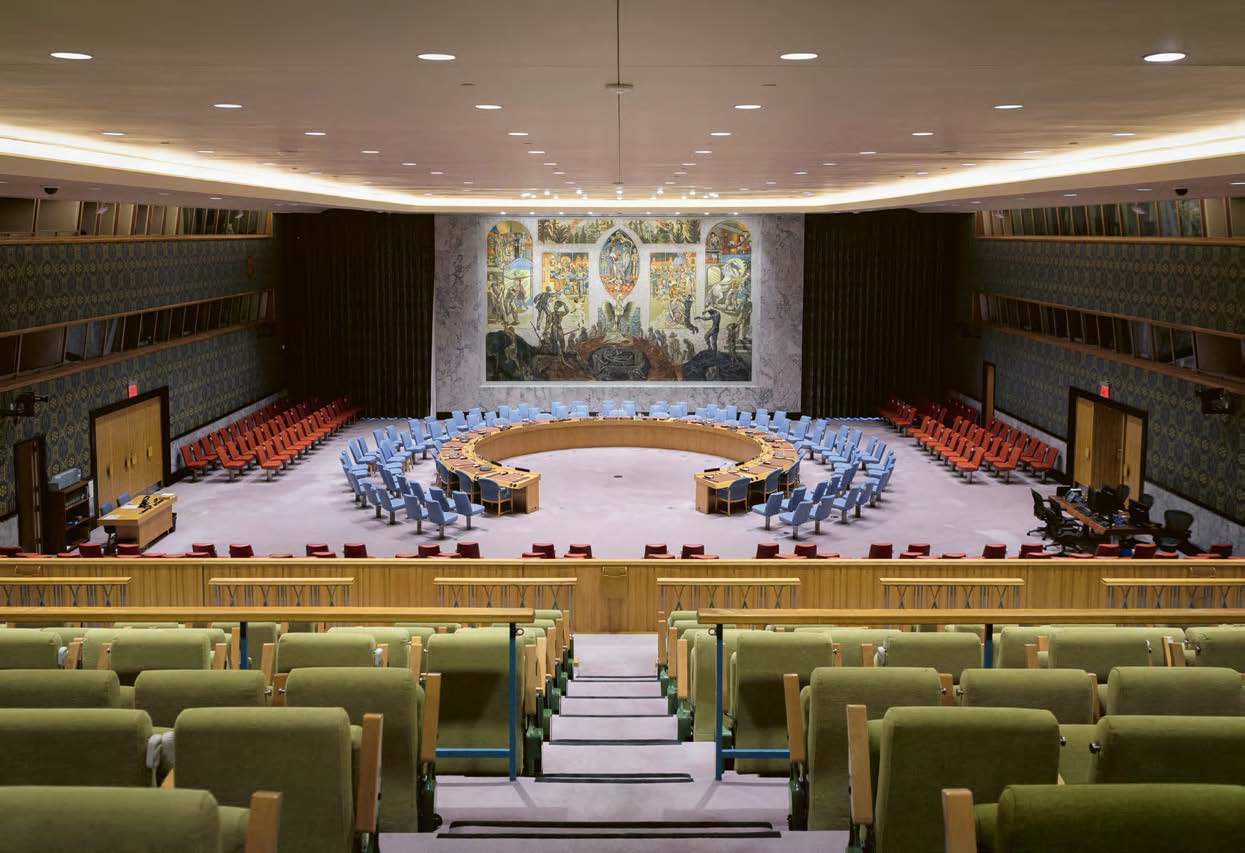On 21 April, the UN Association of the United Kingdom and the Together First campaign launched an important report by Mona Ali Khalil*, a respected public international lawyer and former Senior Legal Officer of the UN Office of the Legal Counsel.
In the report, Mona makes a number of recommendations, on the occasion of the UN’s 75th anniversary, to uphold the primary responsibility of the UN Security Council for the maintenance of international peace and security. UN Today had the opportunity to talk to Mona about her report and its recommendations. We are pleased to share our questions and her answers with you.
To what degree do you believe the Charter is still relevant in today’s world?
While the UN has so far successfully averted a third world war, the US/UK aggression in Iraq and the Russian aggression in Ukraine remind us that interstate conflicts involving the big powers remain a real and present danger. These violations of the UN Charter are compounded by the Security Council’s failure to resolve long-standing intrastate conflicts including in the DRC, Syria and Yemen; to end illegal occupations including in Palestine and Western Sahara; and to prevent genocide including against the Darfuri and Rohingya peoples. To make matters even worse, the Security Council’s seems unable to address emerging existential threats posed by the COVID-19 crisis and the climate change crisis.
The 75th Anniversary of the United Nations is a good time to recommit to the primacy of the UN Charter; it could be our last chance to resurrect the Security Council’s sense of responsibility and its permanent members’ commitment to multilateral action to overcome common challenges.
Which reforms are key to ensuring the Security Council’s future effectiveness?
The report offers several recommendations aimed at enhancing the Security Council’s responsiveness, inclusiveness and transparency. The main recommendation echoes the call made by a majority of UN member states to the members of the Security Council, especially the five permanent members, to refrain from casting a negative vote on any resolution involving credible allegations of mass atrocity crimes. When a permanent member vetoes a draft resolution involving genocide, ethnic cleansing, crimes against humanity or war crimes, it prevents the Council from fulfilling its Charter responsibility and it prevents the international community from fulfilling its responsibility to protect.
The second recommendation I wish to highlight calls for greater use of Arria-formula meetings to hear from non-State parties to intra-State conflicts. The Council’s practice of convening Arria-formula meetings should be used to invite legitimate non-State parties to intrastate conflicts. Hearing from all parties to a conflict and giving them a voice is necessary — not only to ensure the fairness of the Security Council’s decision-making process but also to enhance its prospects of success.
We hear a lot about the revitalization of the General Assembly. What role should the GA play?
My report also advocates for greater use of General Assembly resolution 377(V), also known as the “Uniting for Peace” resolution. By according the Security Council primary as opposed to exclusive responsibility, the UN Charter reserves a measure of residual authority in the General Assembly. As stated in the preamble to resolution 377(V), the failure of the Security Council to discharge its primary responsibility “does not relieve Member States of their obligations or the United Nations of its responsibility” nor does it “deprive the General Assembly of its rights or relieve it of its responsibilities under the Charter to maintain international peace and security”. Thus, whenever the Security Council, as a result of a veto by one or more of its permanent members, fails to fulfil its primary responsibility to prevent or stop mass atrocity crimes, the General Assembly must act in its place.
Last year, you wrote an article about the need to restore the independence of the international civil service. How does this impact international peace and security?
The UN Secretariat must live up to the UN Charter’s vision of a separate and independent principal organ. The Secretary-General must also exercise the self-determining authority, granted to him in Article 99 of the UN Charter, to bring matters to the Security Council’s attention and to recall its responsibility to take prompt and effective action. In doing so, he should also recommend concrete measures the Security Council can take to maintain international peace and security and to ensure accountability for serious violations of international law.
In closing, what message do you hope the report will send on the UN’s 75th Anniversary?
I hope that the power of principles is ultimately greater than the principles of power – not just for the sake of the United Nations itself but more urgently for the sake of the peoples of the world whom the UN was created to protect from the vagaries of unprincipled power.
*: Mona Ali Khalil is a public international lawyer with 25+ years of UN and other experience. She holds a B.A. and M.A. from Harvard University and a Master’s in Foreign Service and a Juris Doctorate from Georgetown University. She is an Affiliate of the Harvard Law School Program on International Law and Armed Conflict. She is the Director of MAK LAW, an international strategic consulting service, which advises governments and intergovernmental organizations in the service of “We the Peoples”.



